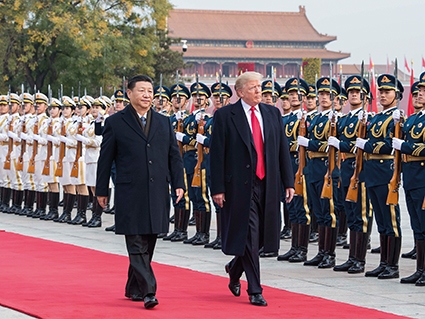US & China Gear Up for Ideological Warfare
Within light of growing US-China competition and problems surrounding Anaklia, Georgia's positioning as the US key strategic partner in the region might come under question. Any volatility on the future of Georgia's Black Sea ports will hinder prospects of greater collaboration between Tbilisi and Washington. This would in the long run open the doors to Chinese investments, limiting America’s strength in the Black Sea.
Current developments in world politics have clearly shown that the 21st century will be more or less a geopolitical contest between the two giants, China and the US.
Many still compare China-US competition to the Cold War of the 20th century between Americans and the Soviets. The scale of the China-US contest is far larger than the 20th century example by involving technological, commercial and military competition. The Soviets could not compete in trade and technologies, while the Chinese nowadays are almost as strong as the Americans.
Thus, these confrontations are of quite different scales. But there was one interesting aspect in the Soviet-American cold war which is rarely mentioned by scholars, analysts and politicians – the ideological dimension.
The Americans, following the end of World War II, started increasingly looking at the Soviet challenge as an ideological battle. It was not merely about democracy being against communism, but more as a free world against oppression. Behind this thinking was a methodical strategic planning, military stratagems as well as effective alliance building abroad. But it was nevertheless important to cushion all of that into the concept of an ideological crusade. It helped the US master its allies across the world and explain that any meandering would lead to their destruction by the Soviet state’s non democratic institutions.
Ideology is important and it has always been so in history. Looking back at the post-WWII years, it is visible how gradually the American political leadership was moving from hopes of reaching possible understanding with Stalin to recognizing that a showdown was imminent. Once this realization happened, an ideological cushion was prepared and it became difficult to stop the US.
Back to the modern US-China competition, politicians and analysts in the West talk about possible consensuses between the two powers on trade and other issues. However, from time to time many even in the US itself fail to grasp how deep the differences between Washington and Beijing are, which limits exponentially the potential for a wide ranging agreement.
What is missed is the various hints coming from the US officials and the documents from American state agencies that Washington is starting to regard China's rise and the challenge it poses the US-led world increasingly within the ideological boundaries.
There is a certain build-up in that sense, and it is likely that the competition with China will be framed as an ideological one in the coming years. As it was during the Cold War period, an ideological showdown will help the US better clarify its aims and ideas to its allies in the years that have seen a relative sluggishness in NATO and the west's stance on global threats in general.
The ideological setup will also help framing the American public's perception, master the country's resources and perhaps reinvigorate the political class' commitment to the transatlantic and Asia-Pacific allies.
At the same time, the ideological frame instituted by the US will likely be responded to by the Chinese side. As the Soviets did, Beijing will follow suit and frame its own worldview more openly and antagonistically (which it has so far explicitly avoided doing) towards the US.
The ideological framing of the competition will also be the last straw which would lead the two countries into the kind of war the Americans and Soviets had. However, while the US in the 20th century sat and waited till the Soviet Union collapsed, simply because the Soviet system was destined to fail economically from the very beginning, a similar expectation would not work for China.
Thus, it is important to watch closely the various statements and reports coming from both Americans and Chinese and how their respective official language evolves into religious, nearly canonical pronouncements of Good against Evil.
By Emil Avdaliani












